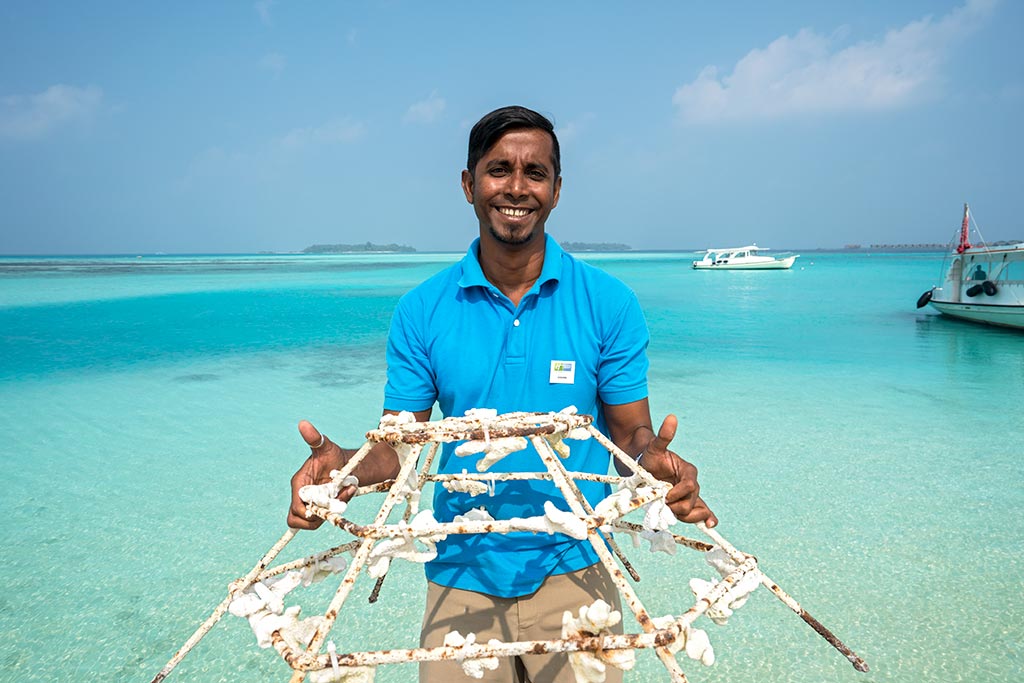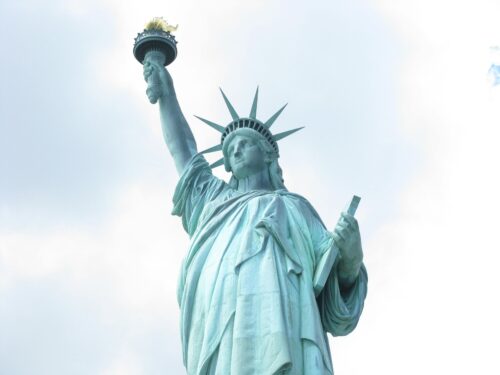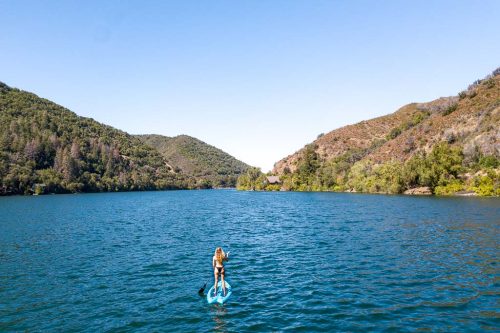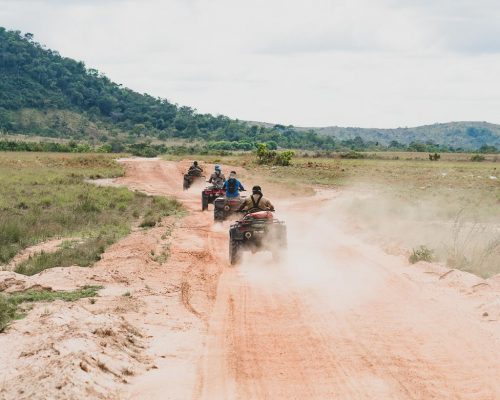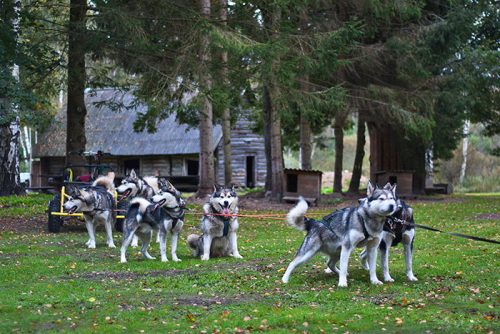If you’ve been following our blog for a while you’ll know that sustainable tourism and responsible travel are huge factors for us in choosing accommodation when we travel. As eco-friendly travel becomes more popular, it can be difficult to know whether a hotel is really committed to environmental protection, or just trying to cash in on a growing trend. Sometimes you have to visit a property in person to really understand the level of commitment to sustainability. Sometimes we have high hopes for a hotel or resort and then arrive to find their “eco”-ness is limited to a recycling bin and a yearly beach clean up.
Luckily, sometimes the exact opposite happens and we’re pleasantly surprised with how much a resort is going above and beyond to be sustainable. That was the case for Holiday Inn Resort Kandooma Maldives. Not only are they practicing what they preach in terms of environmental sustainability, but they’re also committed to wildlife protection and cultural preservation. The commitment to all three is what really knocks it out of the park for us. Here’s what the Holiday Inn Kandooma is doing to keep the Maldives an incredible place for locals and tourists.
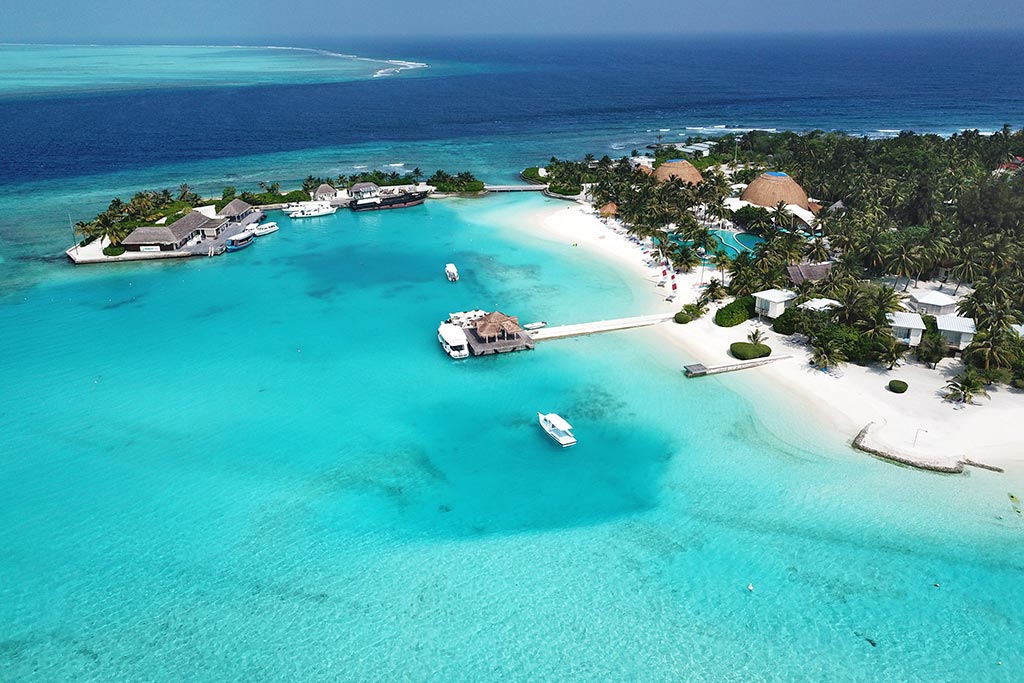
Ethical Animal Tours in the Maldives
Snorkeling with Sea Turtles
We’re always weary when hotels and resorts offer animal tours to their guests. We understand that tourists are interested in interacting with exotic animals when on vacation, but too often these activities negatively impact the wildlife population. Before booking any excursions where animals are involved, we always run through a checklist to see if the activity includes touching, feeding, or otherwise impacting the natural behavior of the wildlife. We were very excited to see that the activities at Holiday Inn Maldives passed our checklist! All of their excursions limit interactions to simply observing the animals from a respectful distance.
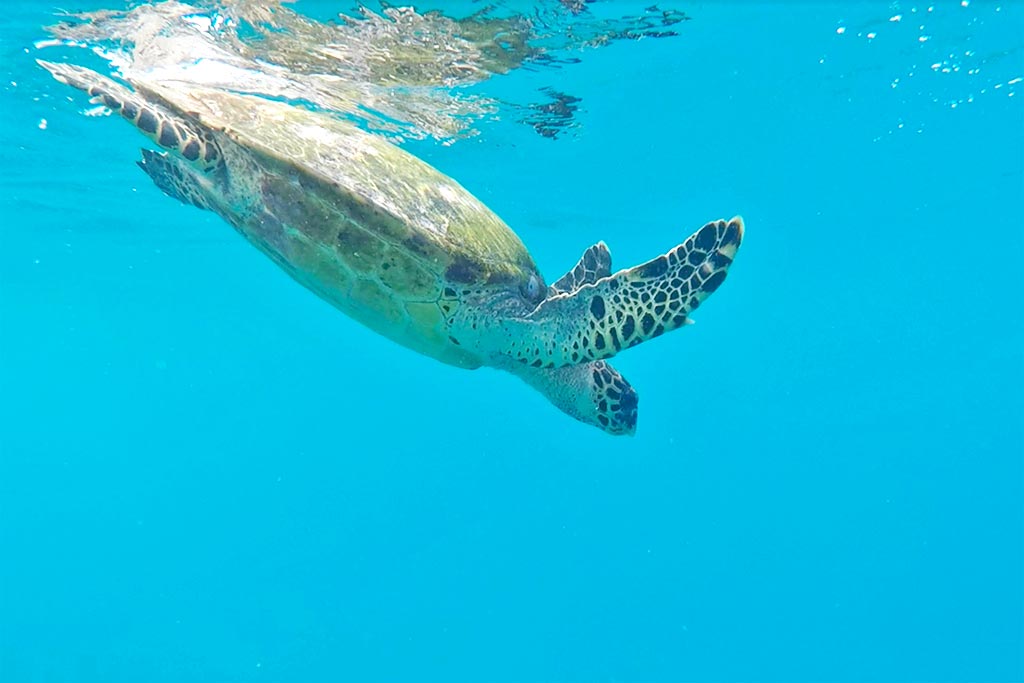
Our first tour was the Turtle Point Reef snorkeling. We took a speed boat to Turtle Point, about 45 minutes from the resort. We donned our mask and flippers and jumped into the water. Just a few minutes after arriving, our guide Ushan had already spotted our first turtle! It’s pretty incredible to watch the turtles float lazily in the water, cruising with the currents and occasionally popping their heads up above the surface.
Sea turtles are incredible creatures. Some species can hold their breath for several hours, with some able to hibernate under water for months! Turtles are protected in the Maldives. Since 1995, it’s been illegal to catch, kill or collect them. All fishing in the Maldives is pole and line fishing, which cuts down on the number of sea life killed from discarded fishing nets. Unfortunately, it is not uncommon for “ghost nets,” nets left or lost by fisherman in other countries, to make their way to the waters of the Maldives. Ushan told us that not long before our arrival a turtle was found tangled in a net. Luckily they were able to cut him free and put him back into the wild. During our snorkeling tour we saw about 6 turtles, each one magnificent and breathtaking. Excursions like these are so important because they educate guests on the fragility of the environment and how our actions at home can affect the environment around the world.
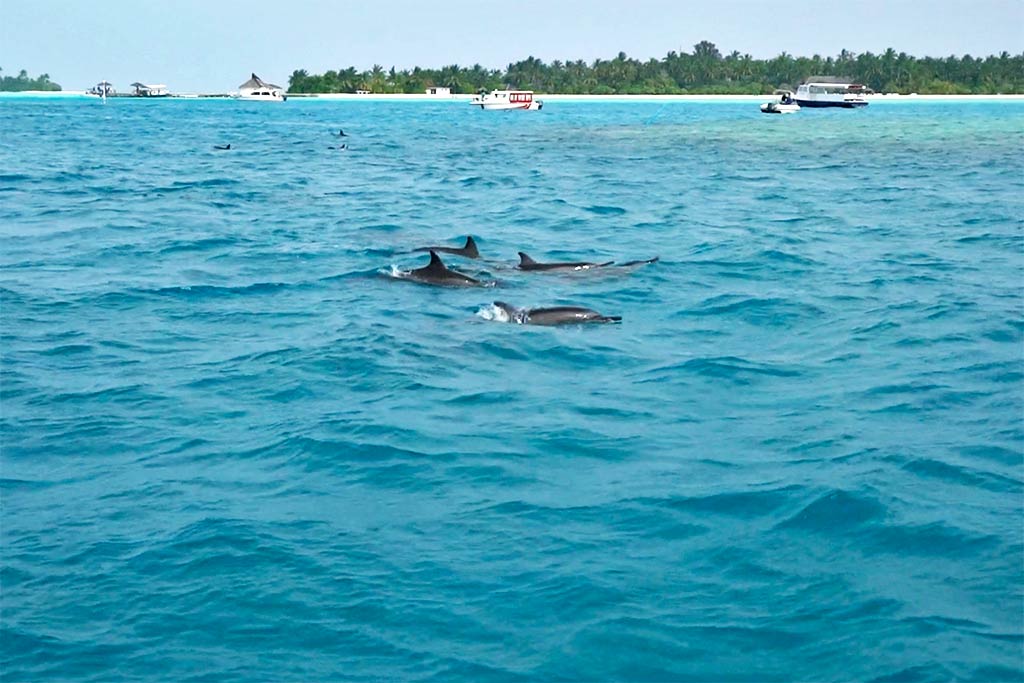
Dolphin Tours
We also took part in the Dolphin Cruise. On this excursion you observe the dolphins from the boat, as opposed to snorkeling with them. It’s not guaranteed to see dolphins, so we felt very fortunate that not long into the trip our boat was surrounded by dozens of them! Huge pods of dolphins were swimming within feet of the boat, their grey fins gliding above the water. Every once in a while a little baby would show off by jumping in the air and spinning around. They really put on a good show for us. Side note: If you don’t see any dolphins on your trip, don’t worry! The hotel will let you join the next Dolphin Cruise free of charge!
Swimming with Whale Sharks in the Maldives
One activity we wanted to go on, but unfortunately couldn’t due to the weather, was the whale shark snorkeling. If you’ve kept up with our blog, you may know that we are big advocates for ethical whale shark tours. One of our most popular articles is why we chose NOT to swim with the whale sharks in Cebu, Philippines. We were very excited to hear that the Holiday Inn Kandooma whale shark snorkeling tour does not include feeding of the animals.
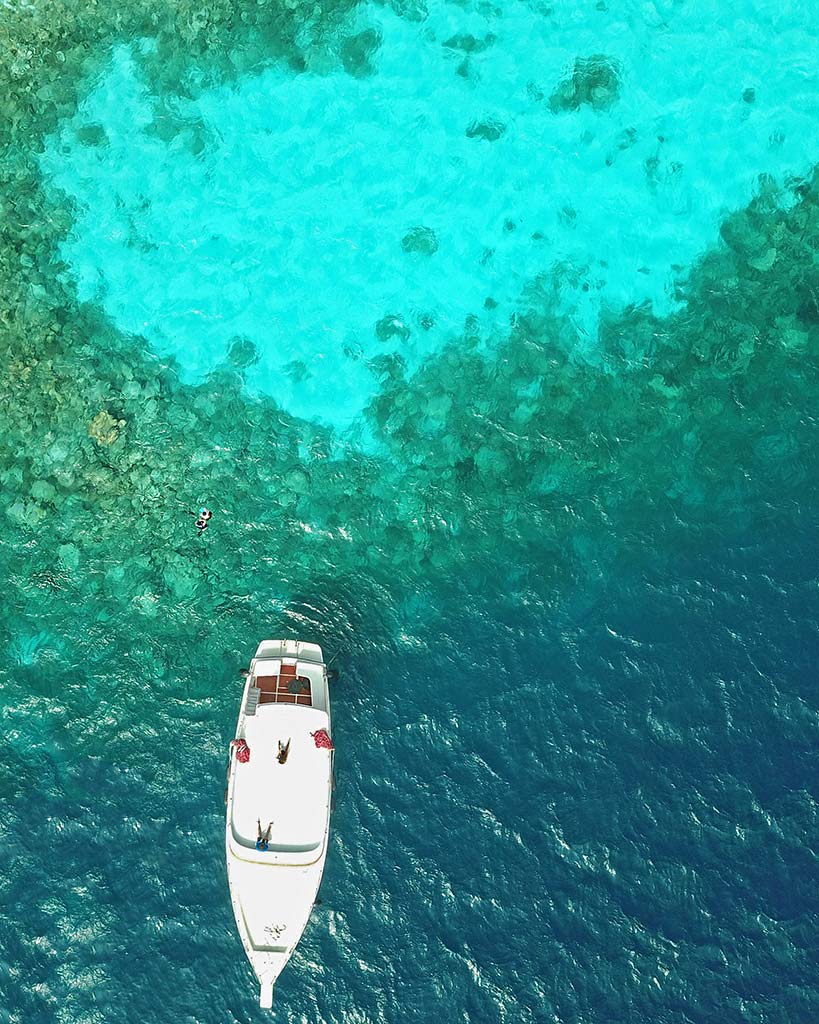
“Chumming,” or the act of luring animals to your boat by throwing fish parts into the water, can affect the eating and migration patterns of sea life. Instead of attracting the whale sharks by chumming the water, the boat operators are always on the lookout for the animals and coordinate with each other via walkie talkie. The guides also educate the guests on keeping a safe distance from the animal, but not because they are dangerous. Whale sharks are actually not sharks, but rather the largest fish species in existence. They’re gentle giants and not at all harmful to humans. They can be quite shy though, so it’s natural for them to take off when they spot you. Because there is no feeding of the animals, it’s not guaranteed that you’ll see any whale sharks.
To get to the snorkeling location, you have to take a speed boat across the channel and depending on the weather this can take 1 and a half to 2 hours. The waves can get quite choppy in the channel, so it’s not recommended for those that get seasick. But even if you experience some seasickness, you may get lucky with a calm day. I can also recommend the motion sickness tablets Bonine, which don’t cause drowsiness like Dramamine. Unfortunately I completely forgot to bring some on this trip! Either way, if you’re able to take the whale shark tour, you’ll be amazed by the beauty and sheer mass of these incredible creatures.
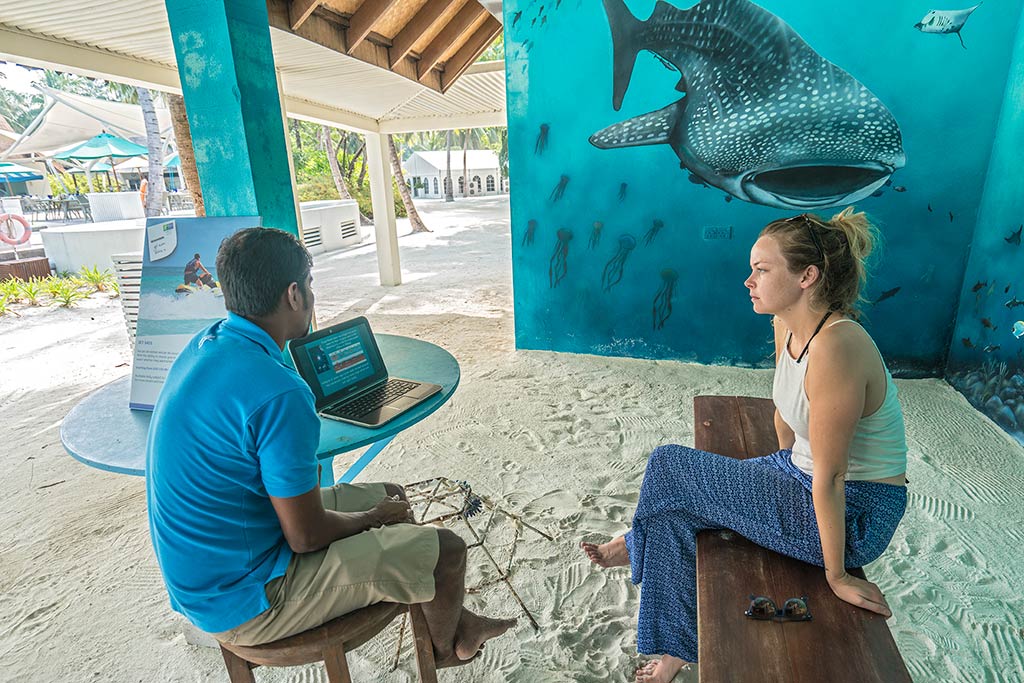
Reefscaping Sustainability Project
One of the activities we were most excited about was the Reefscaping Project – and it did not disappoint! We always look for hotels that go above and beyond with sustainability initiatives. That’s what Holiday Inn Resort Kandooma has done with their Reefscaping Project. Unfortunately the Maldives have suffered through a series of coral bleaching. Coral bleaching happens when the water temperatures rise and the algae that lives in their tissues is expelled. This causes the coral to turn white and become more susceptible to dying.
There was a terrible coral bleaching in 1998 that killed about 90% of the coral in the Maldives. It began to regrow, but then another series of bleaching in 2010, 2012 and 2016 killed around 60-70% of the Maldives’ coral. Coral are incredibly important to the ecosystem of the ocean. Not only does coral provide shelter for small fish, it also plays a part in the ocean food chain, giving nutrients to other sea life. Bright, vibrant coral is also a huge draw for tourists wanting to snorkel in the Maldives coral reef.
Thankfully, the Holiday Inn Kandooma is doing its part to regrow the coral population. With their Reefscaping Project, they snap off pieces of live coral and use wire to tie them to a structure. The structure is then placed in the ocean. By cutting the coral, you’re actually stimulating new growth. It’s a similar process to cutting off the top of a pineapple and replanting it to grow a new fruit. Ushan, the resort’s marine biology expert, leads the Reefscaping project.
Guests can sponsor a structure and even have their name written on a tag to be placed on the structure. Guests who sponsor the project have the opportunity to sit down with Ushan and learn more about the importance of reefscaping. They can participate in creating the structure with coral pieces, as well as snorkeling out out to the location to ‘plant’ it in the ocean. Guests will also receive periodic updates on the project. So much cooler than bringing home a souvenir is knowing that you’ve contributed to reviving the coral reef!
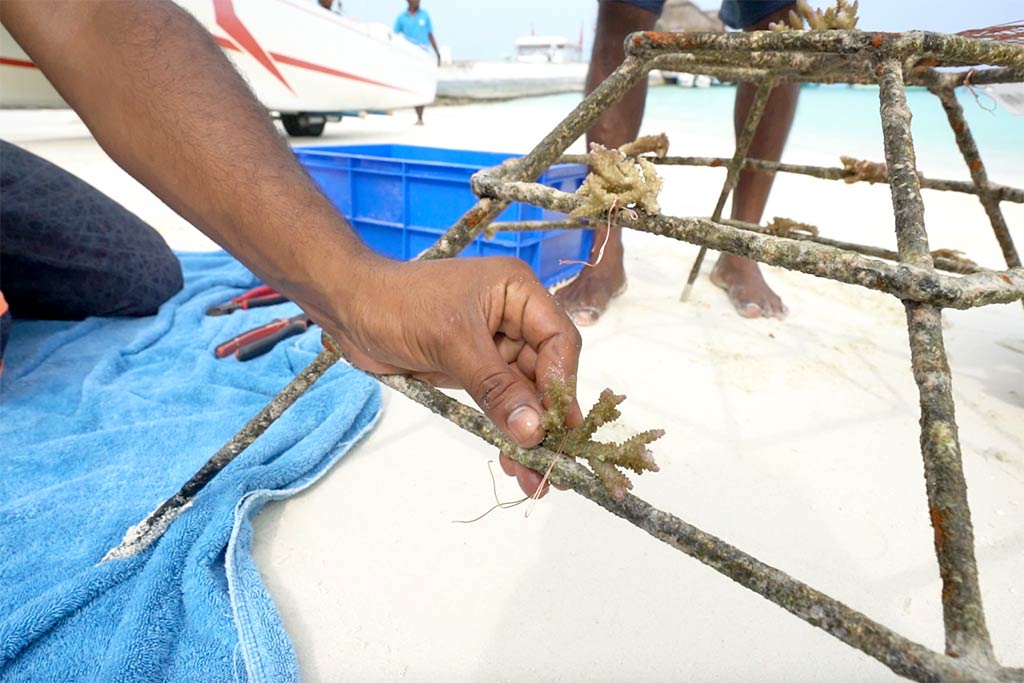
Sustainability at the Holiday Inn Resort Kandooma
Not only is the Holiday Inn Resort Kandooma doing its part to protect the Maldivian ecosystem, they’re also doing their part to look inward and examine their own impact on the environment. Several sustainability initiatives have been adopted to reduce waste and lower their carbon footprint. One simple, but incredibly effective initiative is using reusable glass bottles of water in guest rooms. This may not seem like a huge undertaking, but it reduces the resort’s plastic use by approximately 650 bottles a day! They’ve been using the glass bottles for the past 8 years. Imagine how much plastic has been saved during that time. I’ll tell you, it’s almost 2 million bottles!
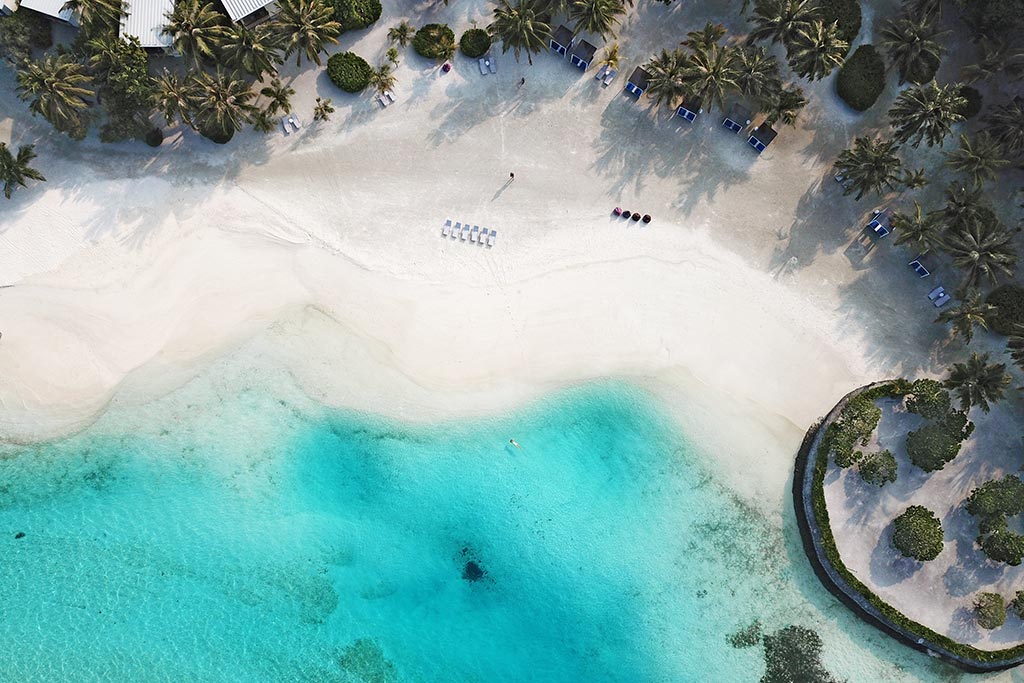
All of the water used at the resort is produced by the island itself. Their desalination plant produces on average 15,500 liters of drinking water per month. Rain water is harvested to be used for guest laundry, saving approximately 50 tons of water per month during the rainy season. The heat generated by the resort generators is used to heat the water in 22 staff rooms and in the desalination plant. This reduces energy consumption needed to heat showers, as well as reduces use of diesel. The resort is planning to expand this project to heat the water in all staff rooms. They also have plans to install solar panels to produce energy from that hot Maldivian sun.
There are tons of small initiatives like these that all add up to reducing the resort’s carbon footprint. From using low wattage light bulbs, to re-using maintenance materials like gloves and paint brushes, it all adds up to help ease the impact on the environment.
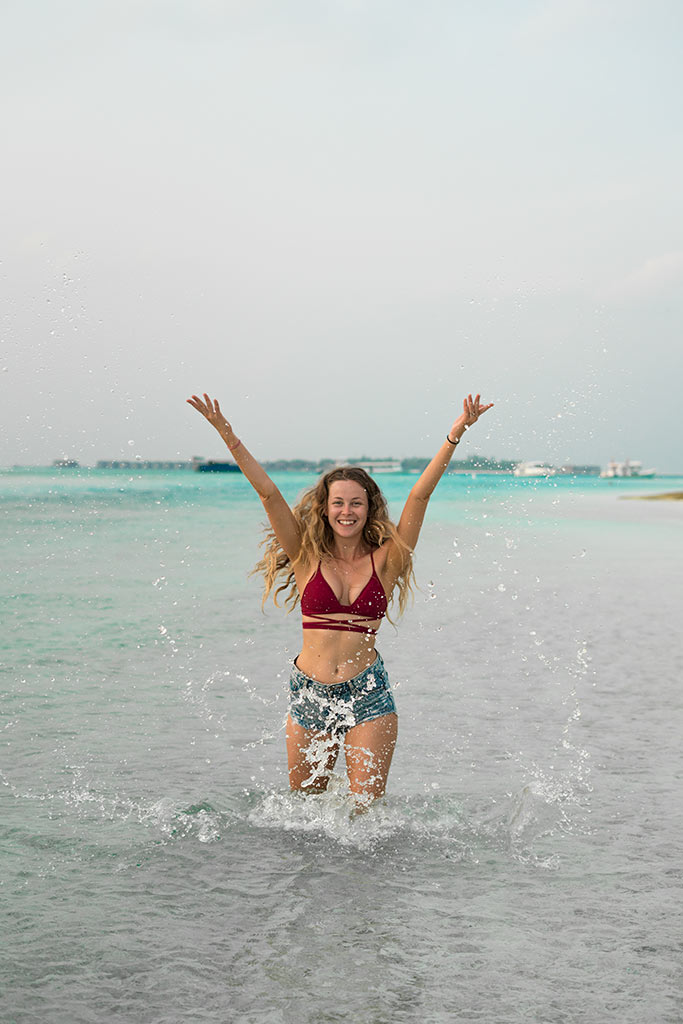
Connection to Community
For us, traveling responsibly is much more than just being environmentally friendly. Sustainability ensures that destinations are protected and preserved for generations to come. That includes cultural traditions, animal welfare and supporting a thriving local community. Too often when tourists visit a resort, they’re unable to get a deeper insight into local life. They’re limited to just interacting with hotel staff. Which, don’t get me wrong, can be a great way to connect with locals. We had an incredible time connecting with the staff at the resort. The hospitality at the Holiday Inn Kandooma is incredible. But when the opportunity presents itself to dive deeper into the local culture, we take it. That’s why we were excited to see that the resort offered a 2 hour tour to the neighboring island.
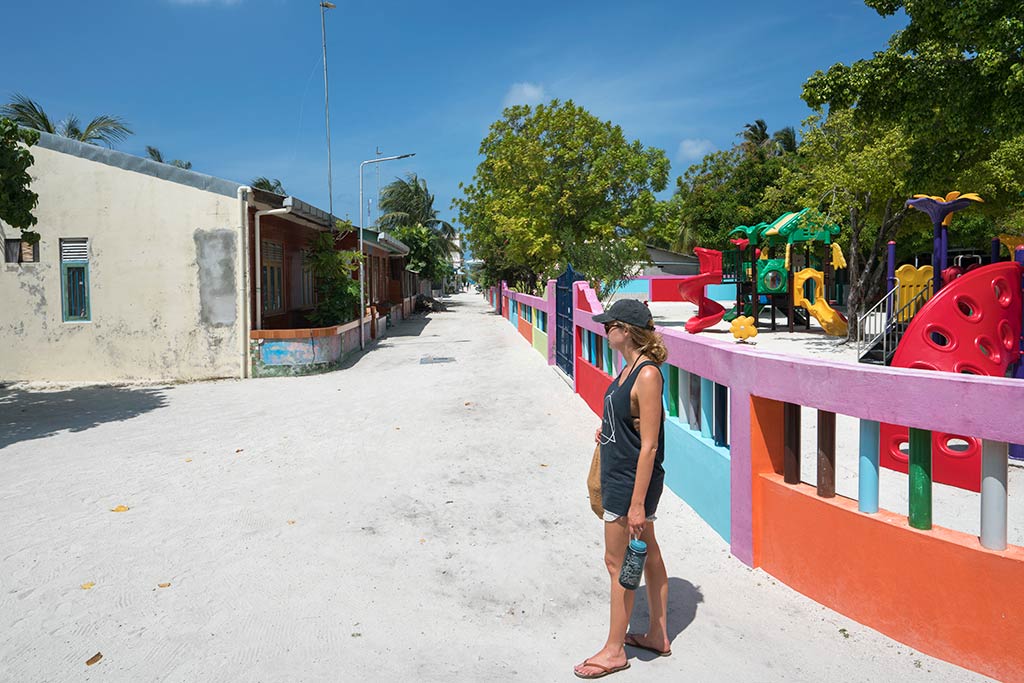
The local tour is a great way to gain some insight into local culture. The Maldives are made up over hundreds of islands. At the moment there are 365 resort islands established for tourism (yep, one for every day of the year!). And there are over 200 local islands, some of which have guest houses, inhabited by local residents. There is a local island a stone’s throw away from Kandooma (literally, if you have a good arm). You can’t swim there because there is a deep channel separating the two. But you can hire a boat from the hotel or take the local island tour.
The tour is only about two hours and you’ll be connected with a local guide. Our guide, Mohammed, gave us a great tour of the town and was happy to answer all our questions about Maldivian life. The Maldives are 100% muslim and the religion has a strong influence over the island. There are 3 mosques on the island (two for men, one for women) and all of the local women wear a burqa or hijab. Every island in the Maldives must have a mosque if there are any people living on it. Even if its a plantation island with only two farmers living there, it still must have a mosque. Visiting local islands is a great way to get a different perspective of the country. You can also add a few extra days to your trip with a stay on the local islands, which is a great way to extend your trip f you’re traveling to the Maldives on a budget.
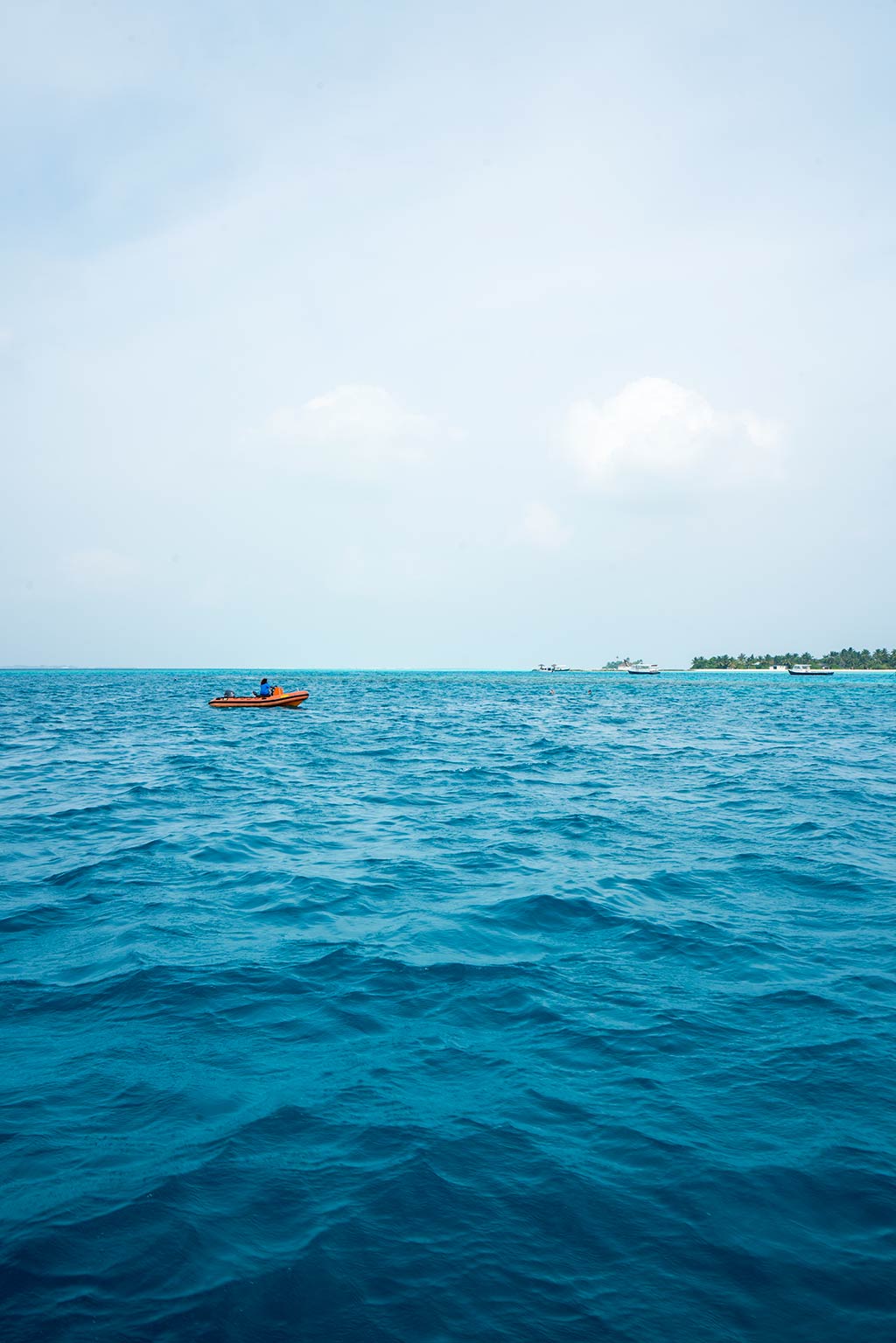
If you’re hesitant to do a tour that exploits the local people and puts them on show for tourists, this is far from it. Locals just went about their daily lives as we strolled through the town. Mohammed showed us interesting things, like how high the water level went to when they suffered through a terrible tsunami in 2004. Toward the end of the tour, the guide will take you to a shop to purchase souvenirs. They alternate which shop they take visitors to, giving each shopkeeper a chance to sell their wares. We’re not really souvenir people, but we do like to support local economies so we bought a couple of small items. There is also a mini-mart in town, which is a good place to pick up some affordable snacks (and yes, they take credit cards). At the end of our tour, Mohammed dropped us back off at the boat and the call to prayer began over a loudspeaker. Mohammed wished us farewell and joined the groups of men making their way to the mosque.
The local island tour may not be a high priority on your Maldives bucket list, but we encourage you taking a couple hours out of your sunbaking to see how Maldivians live. Supporting locals in this way ensures that community’s will profit from tourist. Spread the wealth, spread the love!
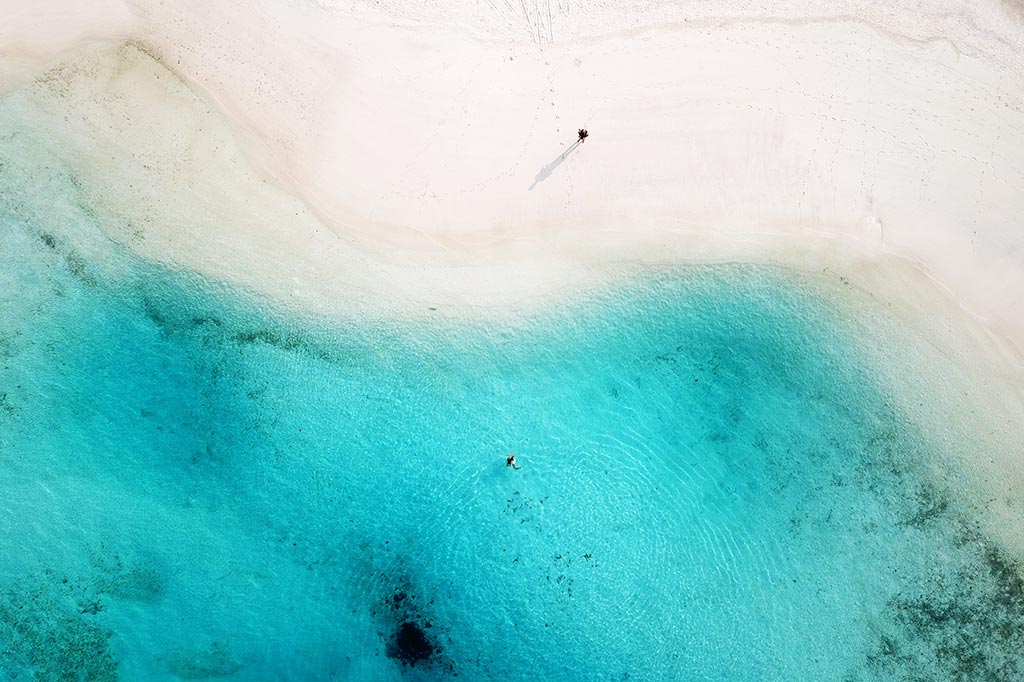
Overall, the sustainability initiatives at the Holiday Inn Maldives exceeded our expectations. From the Reefscaping Project to the eco-initiatives, it’s clear that the resort is committed to protecting the gorgeous environment that draws so many people to this stunning destination. Beyond the environmentally conscious efforts, the resort is focused on protecting the wildlife population and the local culture. It’s the combination of these efforts that make the Holiday Inn Resort Kandooma Maldives such an outstanding place to stay.
Thanks to the Holiday Inn Resort Kandooma Maldives and InterContinental Hotels Group for hosting us in the Maldives. As always, all opinions and thoughts are our own and we’d never recommend a destination or hotel we didn’t fully support.

